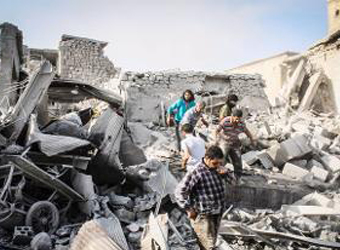Syria’s peace talks in Geneva this week should benefit from a tighter format and a deal to reduce the violence, U.N. mediator Staffan de Mistura said on Monday, playing down dismissive comments by President Bashar al-Assad.
Previous rounds of talks have produced agreement that the warring sides will discuss a four-part agenda, but no progress has yet been made on any topic.
Under pressure from international backers, the two sides have agreed to discuss a new constitution, reformed governance, new elections and the fight against terrorism, but they differ sharply over what those agenda items mean.
Assad, backed by Russia and Iran, is keen on discussing “terrorism”, a term he uses broadly to describe all adversaries. Opposition negotiators have demanded Assad’s removal, something his backers think is fanciful in the face of his military advances in the civil war, now in its seventh year.
Last week Assad told Belarusian TV channel ONT that the Geneva talks were “merely a meeting for the media” and there had been “nothing substantial in all the Geneva meetings”.
De Mistura said Assad’s negotiator Bashar al-Ja’afari had arrived in Geneva with an 18-strong negotiating delegation “empowered for serious discussions”. He denied the United Nations was being used as a diplomatic smokescreen for more war.
“If being a mediator and trying to find common points (means) ‘being used’, I would accept that. The alternative is no discussion, no hope, no political horizon, just waiting for facts on the ground to take place,” de Mistura told reporters.
“Facts on the ground” – U.N. jargon meaning “war” – will not produce a political solution to the intractable conflict which all sides had committed, he said.
Opposition negotiator Nasr al-Hariri told reporters he wanted a comprehensive ceasefire across Syria.
“The road to Syria’s freedom runs through Geneva,” he said.
“That’s why we have come here to Geneva committed to negotiate a political solution and that’s why Assad is frightened of this process. He is afraid to engage on the agenda of political solution.”
De Mistura said the United States, which has supported the opposition in the past, was increasingly engaged and interested in the process, and he hinted at high-level diplomacy going on behind the scenes.
“Everything is connected. There are big important meetings taking place, that will be taking place. There are discussions taking place in capitals. They do have an impact on what we discuss. But I am not going to elaborate now,” he said.
The Geneva round of talks comes on the heels of a deal by Russia, Turkey and Iran to arrange and monitor “de-escalation zones” in Syria to ease the fighting.
Previous rounds in Geneva have proceeded at funereal pace, punctuated by what critics have called grandstanding media appearances by rival negotiators.
This round will be shorter and more business-like, starting on Tuesday and ending by Saturday, and with less room for rhetoric, de Mistura said.
“Even the rooms will be smaller, the type of meetings will be a little bit more interactive and proactive and more frequent, we will also choose some subjects to be focused on in order to get more movement,” he said.
Source: Reuters
